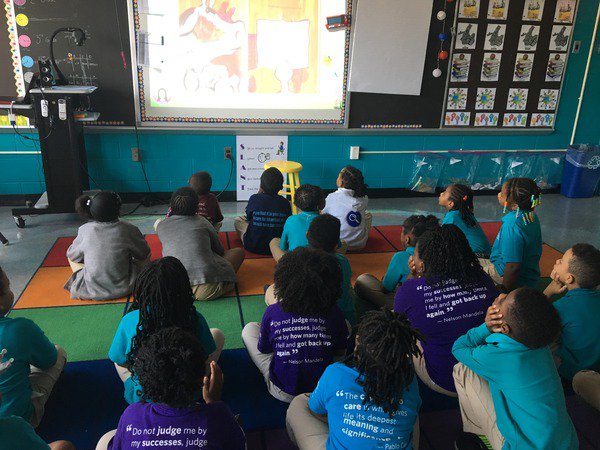Elementary school tackles tough issues through new curriculum
ByMarva Hinton
Read the full article at EdWeek.org >
Children as young as 5 are learning about the protests in the NFL, DACA, and President Donald Trump’s travel ban at an elementary school in Newark, N.J.
It’s part of Seek Academy’s social justice class, which was introduced this year. But a teacher at the school began tackling these controversial topics last year during a 15-minute current events class.
“There shouldn’t be an age limit for them to start learning about wealth, opportunities, and privilege,” said Victoria Clinton, the school’s social justice teacher. “They’re capable of having these conversations really early. They need to know what’s going on in the world because they’re citizens of this world.”
This year the school, which is a part of the KIPP network of public charter schools, decided to add an 85-minute weekly social justice-focused social studies class to its curriculum. The first 30 minutes of the class are spent discussing current events with a focus on social justice, and then Clinton delves into a more typical social studies lesson. KIPP, which focuses on providing children with a college-prep experience, calls its students scholars. All 560 of them at Clinton’s school take her class once a week.
Clinton, who’s been teaching at Seek Academy for five years, said her ideas about introducing young children to these topics come from her own upbringing.
The majority of the scholars at Clinton’s school are black. She said she feels it’s especially important for young people of color to have these discussions because of the discrimination they’re likely to face outside the school.
This Week’s Lesson
This past week Clinton has been talking to them about the NFL players who chose to kneel during the national anthem. This was a topic she first addressed with them last year.
To help her explain things to students Clinton often relies on multimedia materials such as videos. To jump-start this week’s discussion, she showed the students video of several of the protests that took place in the league last weekend as well as a video of Colin Kaepernick, the former NFL player who started the movement last year, talking about how he wanted to use the protest to draw attention to police brutality against African-Americans. The scholars then discussed Trump’s reaction to the protests. And Clinton ended the lesson by asking the scholars what they would do if they played in the NFL.
“That’s the most interesting part of the conversation,” said Clinton. “It’s really cool to hear what they have to say. They’re becoming critical thinkers. They’re becoming independent learners. They push their families to have conversations about this because they want to learn more.”
She said her scholars also develop the ability to express themselves through writing about these topics. But what she sees as the biggest takeaway for them is the idea that if they see an injustice happening they should speak up about it.
Sometimes when teachers take on controversial topics they face pushback from parents or administrators, but Clinton said so far that hasn’t happened at her school.
“The most controversial topic that we’ve had so far for the year has been this football discussion, and I haven’t gotten any phone calls from parents, thankfully,” said Clinton, who attributes that to maintaining a neutral stance on the issues discussed in class.
She said she doesn’t give her personal opinions but instead just provides facts and lets the scholars sort it all out. She notes that even children in kindergarten and 1st grade have a keen sense of fairness and equality.
Currently, this social justice curriculum is being taught at two KIPP elementary schools in New Jersey, and there are plans to expand it to other schools in the network.
